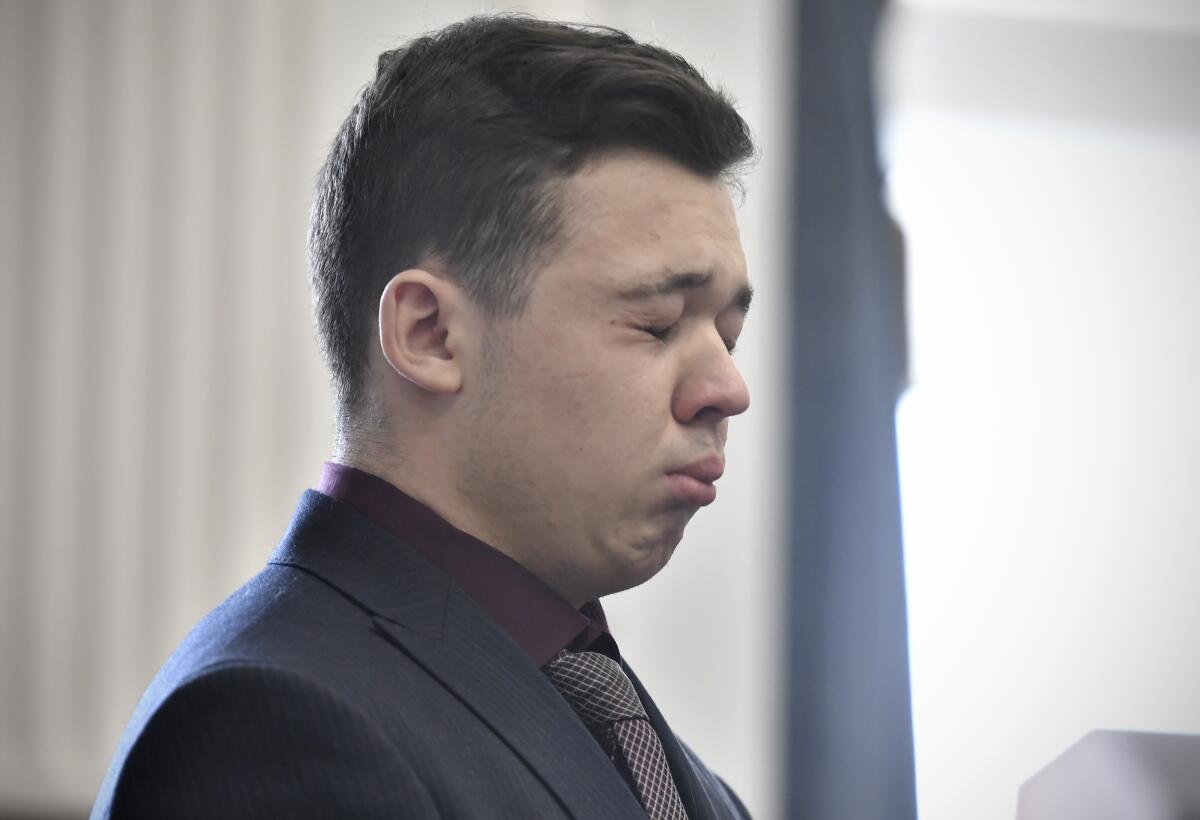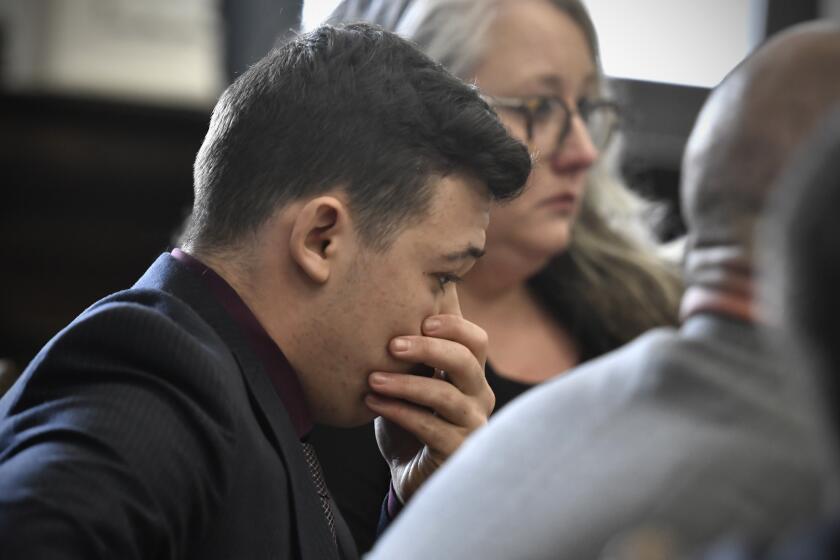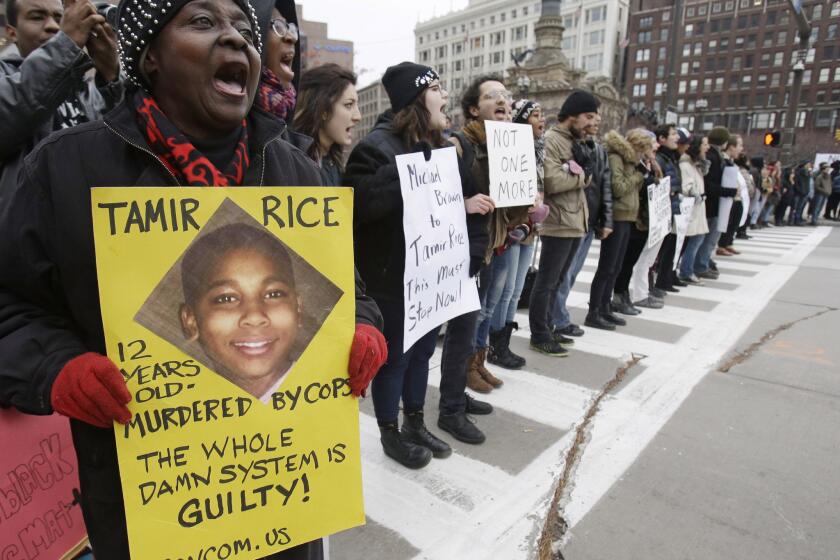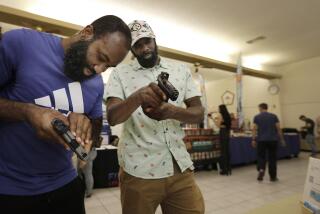The verdict in the Kyle Rittenhouse trial sends a chilling message

- Share via
A jury decides only the case before it, based on the evidence presented. But its verdict can send a message to society. The acquittal of Kyle Rittenhouse on all counts sends a chilling message about the acceptability of vigilantism.
At a time when the United States is deeply ideologically polarized and the Supreme Court is likely soon to recognize a right to have concealed weapons in public, the social implications of the Rittenhouse verdict are frightening.
Rittenhouse, then age 17, went to Kenosha, Wis., where protests were expected after police officers shot and seriously injured Jacob Blake. Rittenhouse had an AR-15-style rifle, which he was too young to legally possess. A teenager carrying an assault-style weapon in a tense situation is a recipe for disaster, and that is exactly what happened. Rittenhouse shot and killed two people and seriously wounded a third.
Kyle Rittenhouse is found not guilty of all charges in the killing of two people during a protest last year in Kenosha, Wis.
Rittenhouse testified at the trial that he went to the city on Aug. 25, 2020, to provide protection for local businesses and patrol as civil unrest developed. There is so much that is disturbing about that: a teenager deciding that he needed to provide law enforcement, when he lacked training or experience, and illegally arming himself with a semiautomatic rifle.
Not surprisingly, Rittenhouse’s presence with a big weapon provoked a reaction. Joseph Rosenbaum, a person with a history of mental illness who had been released from the hospital that day, allegedly grabbed at Rittenhouse’s gun and then was shot four times and killed. Anthony Huber apparently struck Rittenhouse with a skateboard. Huber then was shot and killed when Rittenhouse thought Huber was reaching for his weapon. Gaige Grosskreutz felt his life was in danger when he saw Huber killed. Grosskreutz reached for a weapon and then was shot and wounded by Rittenhouse.
The jury, in acquitting Rittenhouse, obviously thought that in each instance Rittenhouse felt sufficiently threatened that he acted in self-defense. The jury, as it was instructed to do, apparently focused just on whether Rittenhouse felt in danger each time he fired his gun.
I worry that the acquittal conveys the message that Rittenhouse did nothing wrong — and some on the right even want to celebrate him as a hero. But looking at the events in this way obscures what precipitated these shootings: a 17-year-old with an assault weapon was misguidedly taking the law into his own hands.
The superpredator theory, created 25 years ago, infected every institution to rob Black children of the protections of childhood.
Our country is more deeply divided than it has been at any time since the Civil War. On Jan. 6, we witnessed an armed insurrection at the nation’s Capitol. In this context, others may well feel emboldened to emulate Rittenhouse, and that can only lead to more tragedies.
I am afraid that all of this will be compounded by a case pending before the Supreme Court. On Nov. 3, the court heard oral arguments in New York Rifle and Pistol Assn. vs. Bruen, which involves a challenge to a New York law, adopted in 1911, that requires a license to carry a concealed firearm. Under the law, a permit is granted only with a showing of a need to have such a weapon.
Based on the justices’ questions at the oral argument, and what’s known about the conservative majority’s views, it seems very likely that the court will strike down the New York law and rule that there is a constitutional right to have guns outside the home, including concealed weapons.
There will be many tense public events, including protests, in the years ahead. The presence of guns, let alone assault weapons, in such situations is something we should all fear. No one brings a firearm to a protest to further civil discourse. As the Rittenhouse case shows, it is all too easy for the presence of guns to encourage the packing of more guns — with armed violence and death as a result. The tragedy in Kenosha could have been avoided. Sometimes the law really ignores common sense.
Erwin Chemerinsky is dean of the UC Berkeley School of Law and a contributing writer to Opinion. He is the author of, most recently, “Presumed Guilty: How the Supreme Court Empowered the Police and Subverted Civil Rights.”
More to Read
A cure for the common opinion
Get thought-provoking perspectives with our weekly newsletter.
You may occasionally receive promotional content from the Los Angeles Times.








